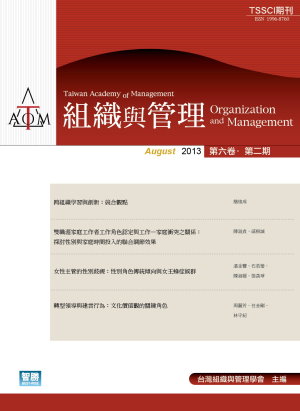Hot News
| 中文篇名 |
雙職涯家庭工作者工作角色認定與工作-家庭衝突之關係:探討性別與家庭時間投入的聯合調節效果 | |
|---|---|---|
| 英文篇名 |
Work-role Identity and Work-Family Conflict of Workers in Dual-career Family: Examining the Joint Effects of Gender and Family Time Commitment | |
| 作者 | ||
| 中文摘要 |
本研究的目的是探討雙職涯家庭工作者之性別與家庭時間投入對工作角色認定與工作—家庭衝突關係的調節效果。我們以社會所賦予的性別角色期許和工作者的家庭時間投入來推論此一三階交互作用,研究對象包括385位中國某企業員工及其配偶的資料。研究結果發現,當工作者的性別是女性時,家庭時間投入弱化了工作角色認定與工作—家庭衝突的正向關係,亦即,低家庭時間投入的女性工作者,她們的工作角色認定與工作—家庭衝突存在正相關;但對高家庭時間投入之女性工作者而言,此關係則被弱化。而當工作者的性別是男性時,其工作角色認定與工作—家庭衝突的正向關係不存在,且此一關係不受到家庭時間投入的調節效果。研究最後根據研究結果進行理論與實務意涵的討論,並提出對未來研究的若干建議。 | |
| 英文摘要 |
The purpose of this study is to examine the interactive effects of gender and family time commitment on the relationship between work role identity and workfamily conflict among dual-career workers. We use social role expectations and workers’ family time commitment to theorize the three-way interaction effects. We collected data from 385 employees in a company in China and their spouses. Our results showed that family time commitment weakened the positive relationships between work role identity and work-family conflict for female respondents. When female respondents committed low amount of family time, their work role identity positively related to work-family conflict. By contrast, when female respondents committed high amount of family time, the positive relationship became weaker. Furthermore, we did not find significant relationships between work role identity and work-family conflict for male respondents, and the moderating effect by family time commitment on the above relationship was found insignificant for male respondents. Theoretical and practical implications are discussed at the end of the paper. Several future research directions are suggested. | |
| 關鍵詞 |
工作角色認定、工作—家庭衝突、性別、家庭時間投入、雙職涯家庭、work role identity、work-family conflict、gender、family time commitment、dual-career family | |
| 刊名 | ||
| 期數 | ||
| 起訖頁 |
047-078 | |
| 出版單位 | ||
| DOI | ||
| QRCode |
| |
| 上一篇 | ||
| 下一篇 |



